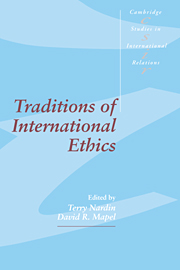Book contents
- Frontmatter
- Contents
- Contributors
- Preface
- 1 ETHICAL TRADITIONS IN INTERNATIONAL AFFAIRS
- 2 THE TRADITION OF INTERNATIONAL LAW
- 3 THE DECLARATORY TRADITION IN MODERN INTERNATIONAL LAW
- 4 CLASSICAL REALISM
- 5 TWENTIETH-CENTURY REALISM
- 6 NATURAL LAW AND INTERNATIONAL ETHICS
- 7 KANT'S GLOBAL RATIONALISM
- 8 UTILITARIANISM AND INTERNATIONAL ETHICS
- 9 THE CONTRACTARIAN TRADITION AND INTERNATIONAL ETHICS
- 10 LIBERALISM AND INTERNATIONAL REFORM
- 11 MARXISM AND INTERNATIONAL ETHICS
- 12 THE IDEA OF RIGHTS IN INTERNATIONAL ETHICS
- 13 BIBLICAL ARGUMENT IN INTERNATIONAL ETHICS
- 14 CONVERGENCE AND DIVERGENCE IN INTERNATIONAL ETHICS
- Index
- Titles in the series
7 - KANT'S GLOBAL RATIONALISM
Published online by Cambridge University Press: 15 September 2009
- Frontmatter
- Contents
- Contributors
- Preface
- 1 ETHICAL TRADITIONS IN INTERNATIONAL AFFAIRS
- 2 THE TRADITION OF INTERNATIONAL LAW
- 3 THE DECLARATORY TRADITION IN MODERN INTERNATIONAL LAW
- 4 CLASSICAL REALISM
- 5 TWENTIETH-CENTURY REALISM
- 6 NATURAL LAW AND INTERNATIONAL ETHICS
- 7 KANT'S GLOBAL RATIONALISM
- 8 UTILITARIANISM AND INTERNATIONAL ETHICS
- 9 THE CONTRACTARIAN TRADITION AND INTERNATIONAL ETHICS
- 10 LIBERALISM AND INTERNATIONAL REFORM
- 11 MARXISM AND INTERNATIONAL ETHICS
- 12 THE IDEA OF RIGHTS IN INTERNATIONAL ETHICS
- 13 BIBLICAL ARGUMENT IN INTERNATIONAL ETHICS
- 14 CONVERGENCE AND DIVERGENCE IN INTERNATIONAL ETHICS
- Index
- Titles in the series
Summary
The impact of Immanuel Kant (1724–1804) on moral theory is ubiquitous. Kantian interpretations of ethical issues in medicine, economics, sociology, and politics flourish. Of special importance is the rapidly emerging influence of Kant on the literature of international affairs; as I hope to show, the Kantian tradition in application to international affairs offers a comprehensive, sophisticated methodology of interpretation. This methodology is agent-centered, places emphasis on moral motives, and allows principles to trump consideration of consequences. From the Kantian perspective, realism turns out to be sadly misguided; ideals prove to be a surer guide than empirical certainty; and cosmopolitanism becomes mandatory.
Kantian ethics
Kant's general theory
By Kant's own admission, his theory of morals provides the foundation for his political philosophy, including its international dimension. Best known for the Critique of Pure Reason (Kant 1929), in which he undertook a “Copernician”-style revolution in metaphysics that made experience beholden to the experiencing mind, Kant in his later moral writings utilizes much of the terminology and analysis presented in his earlier theoretical reflections. If our understanding of reality is conditioned by pure concepts known prior to experience (called by Kant a priori in order to distinguish them from concepts known after experience, called a posteriori), as he had argued in the first Critique, then similarly our action is subject to rational conditions established by pure, a priori concepts.
- Type
- Chapter
- Information
- Traditions of International Ethics , pp. 136 - 157Publisher: Cambridge University PressPrint publication year: 1992
- 7
- Cited by



